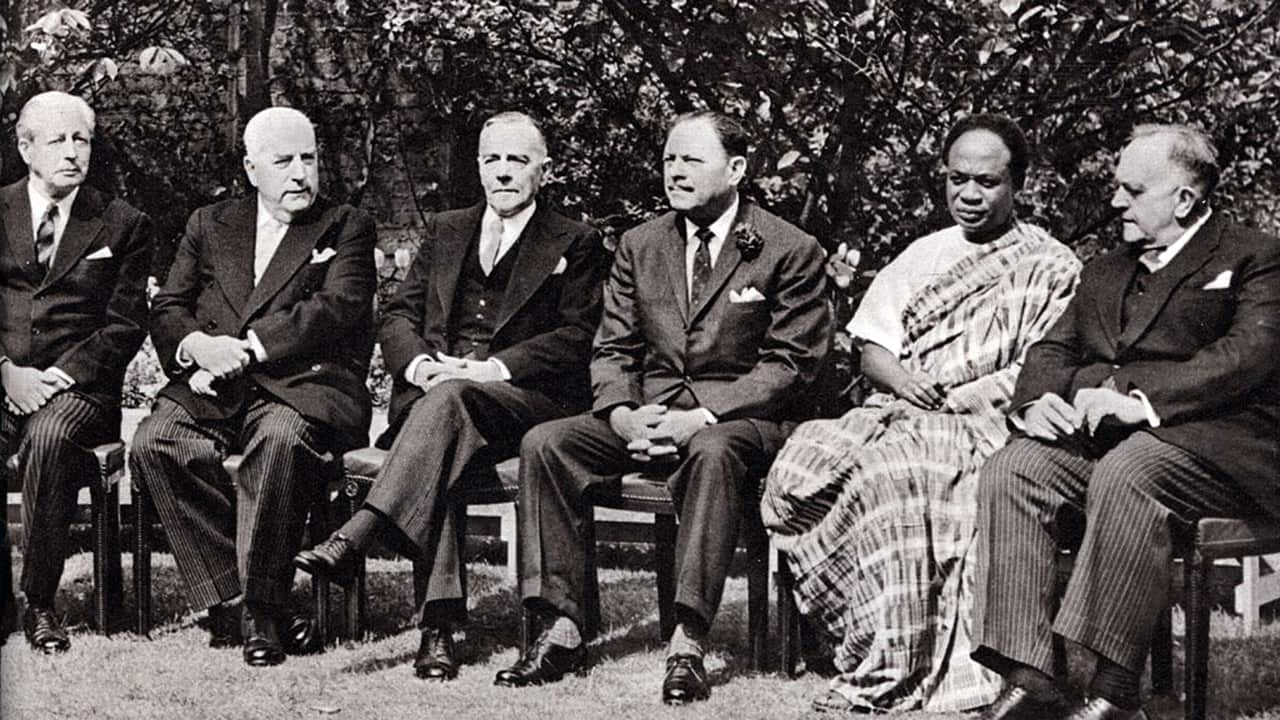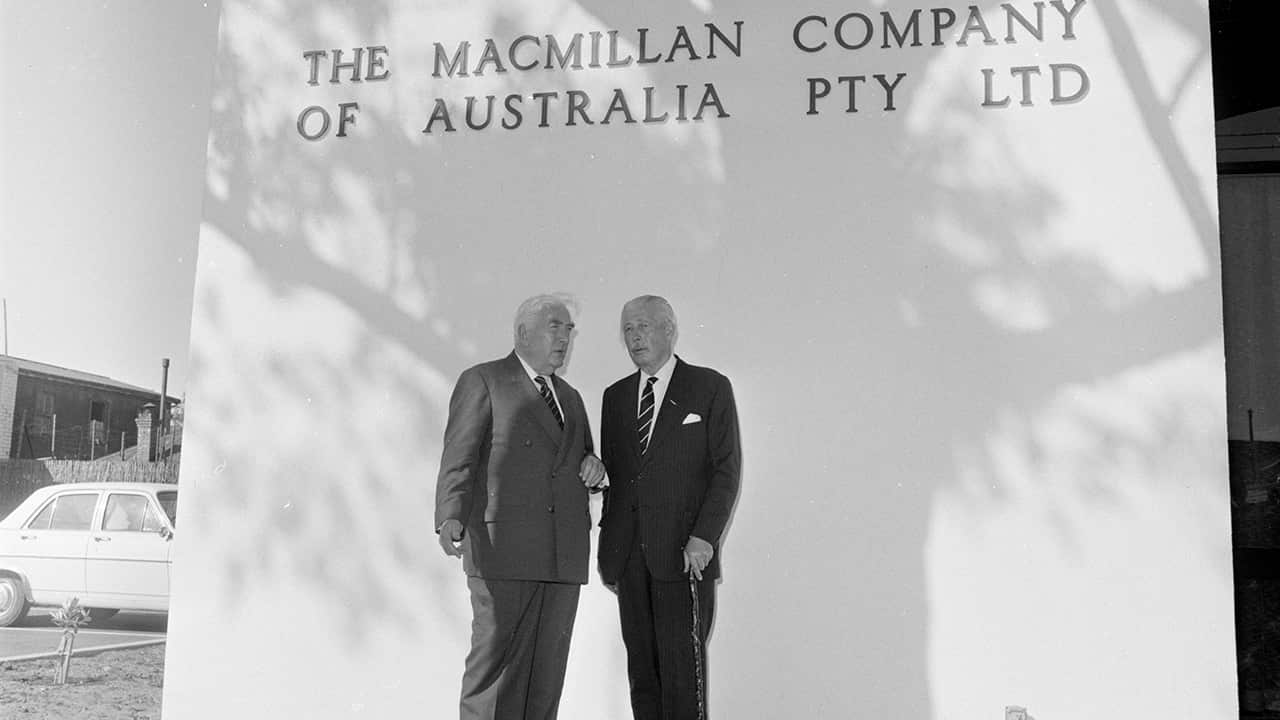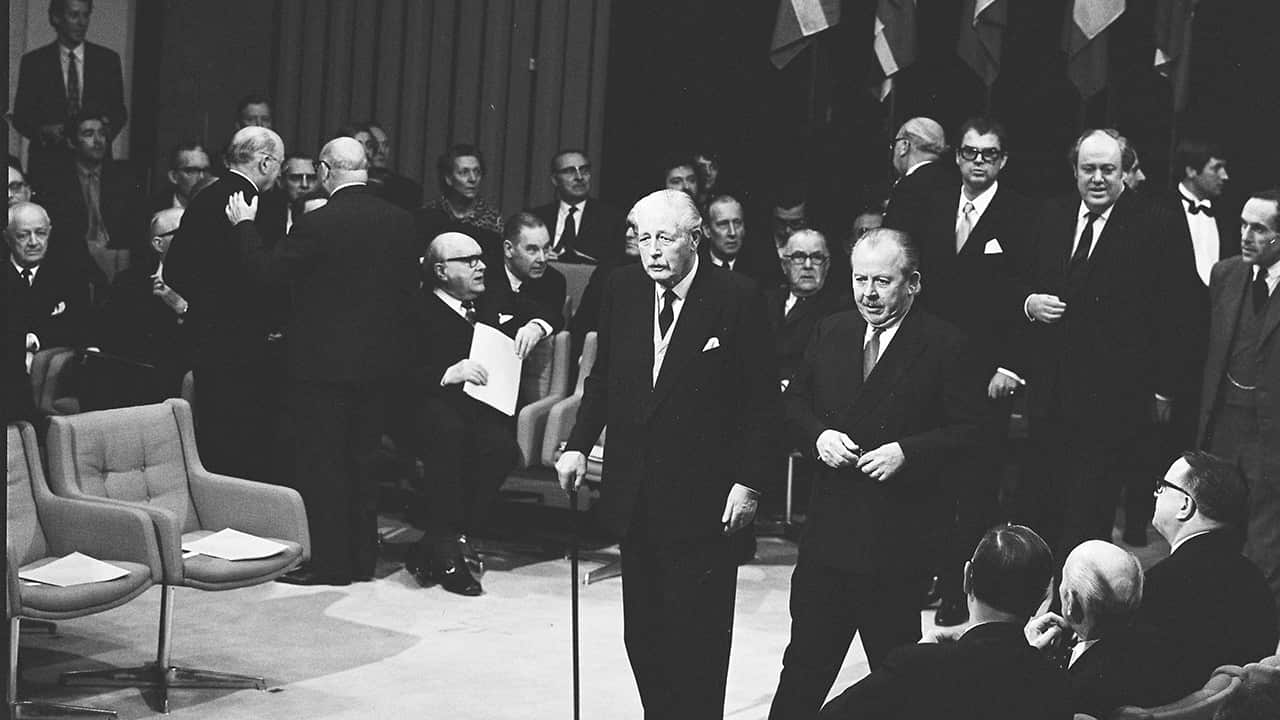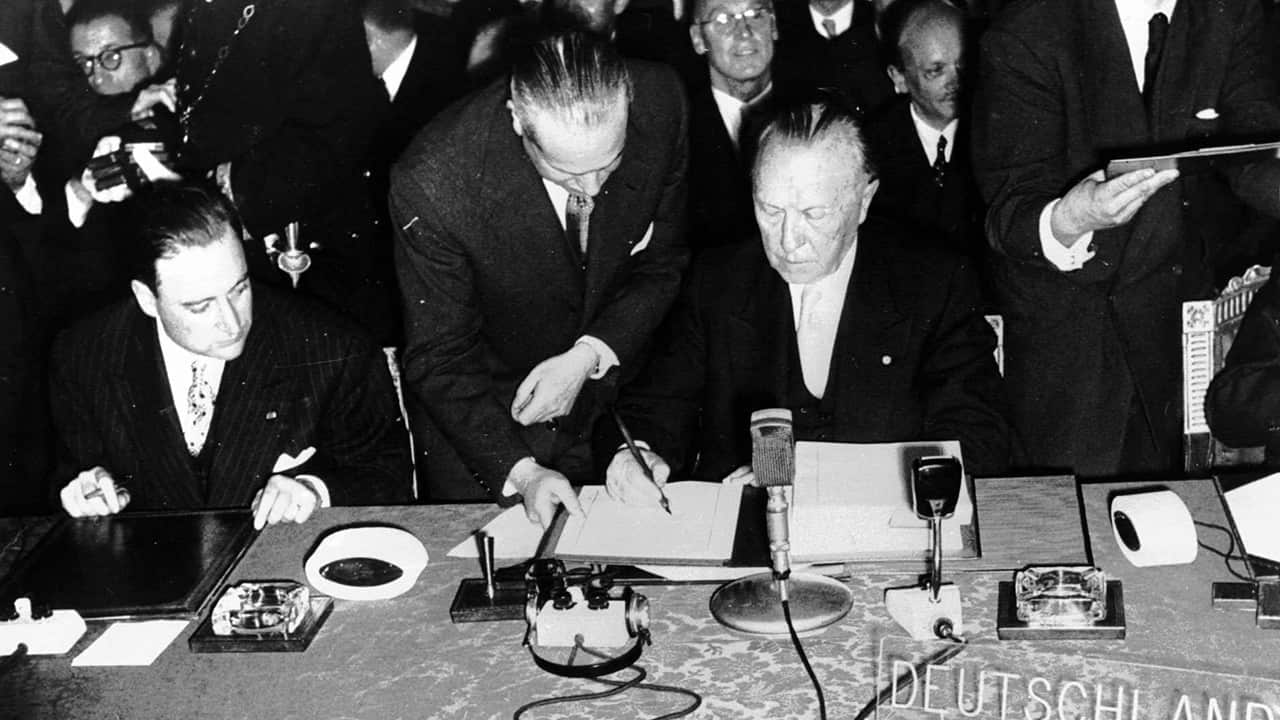The documents show Sir Robert Menzies openly questioned the Commonwealth's viability and accused new member nations of “thriving on antagonism” by waging a coordinated campaign of “anti-colonialism” engineered to strip “the white men” of their power.
The former Prime Minister also joined forces with former President of the United States John F. Kennedy to personally encourage the United Kingdom to join the European Economic Community, now known as the modern European Union.
So sensitive were the never-before-seen “personal and private” telegrams exchanged by the Liberal Party founder and British Prime Minister Harold Macmillan in 1962, the Secretary of the Cabinet warned they should not be read “by anyone at all” in the civil service, even instructing bureaucrats in Canberra to further limit their circulation.
'Out with the white men'
“Any enthusiasm I had for the new Commonwealth is waning fast”, Prime Minister Menzies confessed to his counterpart in London.
“People like me are too deeply royalist at heart to live comfortably in a nest of republics.
“The new republics seem to thrive on antagonism.
“They appear to have less affinity with our own conception of freedom than they have with Moscow and Peking.
“In the depths of our being, we have little or nothing in common with them.
“For most of the new members, the cry of ‘anti-colonialism’ seems to be the raison d’etre of nationalism.
“For, as we see so clearly out here, ‘anti-colonialism’ means ‘out with the white men’.

“Quite frankly I think we retain certain communities in the Commonwealth for inadequate reasons.
“To take a sample case, I can understand why Ghana wants to remain in the Commonwealth.
“In the hope of benefits.
“But it contributes nothing.
“The truth is that the Commonwealth, which used to have a structure and a spirit, is rapidly becoming a sort of tower of Babel.
“We run the grave risk of disintegration.”
Prime Minister Menzies complained about his “uncomfortably close” 1961 election victory, revealing a reluctance to travel to London for a Commonwealth Prime Ministers’ meeting.
“I must confess I did not enjoy the last two very much,” he said in the communication.
His reluctance was also because he said his “nominal majority includes one or two people who would be quite happy to make mischief in my absence” and he feared an extended absence from Canberra could see a repeat of his “bitter experience” in 1941, when he was ousted from office during a similar visit to Britain.
The Prime Minister also vented his fury at plans to discuss increased “movement of populations between Commonwealth countries” at the upcoming summit.

“If we were at liberty to discuss the internal racial policies of one member, it would be quite legitimate that at some subsequent meeting to discuss, for example, the Australian immigration policy which is aimed at avoiding internal racial problems by the expedient of keeping coloured immigrants out”, the Prime Minister huffed.
“We already have a mass of new members of the Commonwealth, some of whom have no real independence except political, and quite a few of whom are strangers to our notions of self-government and civilised administration.
“Many of us have great anxiety about the Commonwealth and the disappearance of so many of its old characteristics.
“They will be acutely increased if it turns out that we in Australia are to be told how we are to manage our own affairs.
“The plain English of it is that the new Commonwealth has nothing like the appeal for us that the old one had.
“When I ask myself what benefit we of the Crown Commonwealth derive from having a somewhat tenuous association with a cluster of republics… some of which like Ghana are more spiritually akin to Moscow than to London, I begin to despair.”
The role of war
Mr Menzies’ forthright observations appear to have struck something of a chord with Harold 'Supermac' Macmillan as he sat at his grand desk overlooking Horse Guards Parade at Admiralty House in London.
Having boldly told British voters they’d “never had it so good” and to embrace “the wind of change”, the last British Prime Minister born during Queen Victoria’s rule and to have fought in World War I painted a very different picture of the world in an uncharacteristically reflective and unsanitised reply. It was deemed so sensitive that it was only ever allowed to be seen by The Queen and First Lord of the Admiralty ... until now.
Having confided that he too believes the Commonwealth has become “an absolute tragedy” with “young and inexperienced” nations “itching to interfere”, Prime Minister Macmillan then devoted nearly 18 pages mulling “the end of the white man’s accepted predominance”, offering a unique insight into the pressures of high office.
“My Dear Bob," he began.
“I know you will let me just ramble on a little as if we were talking in a room together – how I wish we could!
“You and I were born into a very different world… and here we are, my dear Bob, two old gentlemen, Prime Ministers of our respective countries, sixty years later, rubbing our eyes and wondering what has happened.
“What has really happened is this.
“By folly and weakness on the one side, and incredible wickedness on the other, Europe has twice pulled itself to pieces in a single generation.
“I do not think the loss of life, terrible as it has been (especially since it always takes its toll of the best), has been the chief loss.
“Nor does the squandering of money and materials amount to much: these can be replaced.
"What has really gone is the prestige of the Europeans – British, French, Germans, call them what you will.
“Whether in the Old World, or migrated to the New World, or settled in Australasia, or in Africa, Europeans have broadly governed the world for over 2,000 years in a more or less coherent unit.
“What the two wars did was to destroy the prestige of the white people.
“For not only did the yellow and blacks watch them tear each other apart, committing the most frightful crimes and acts of barbarism against each other, they actually saw them enlisting their own yellows and blacks to fight other Europeans, other whites.
“It was bad enough for the white men to fight each other, but it was worse when they brought in their dependents.
“And what we have really seen since the war is the revolt of the yellows and blacks from the automatic leadership and control of the whites.
These are staggering personal reflections from a Prime Minister who so publicly embraced decolonisation.
A process, he wrote, had seen the death of “universal pride and confidence in the successful transformation of territories won haphazardly into an orderly Empire consisting of two great divisions".
“Of these the first included the mother country and the countries of British tradition – Canada, Australia and New Zealand, and, with all the problems of the Boers, South Africa.
“Here there was no difficulty… there was the Empire of the free, independent, advanced, civilised, Christian people that you now correctly call the Crown Commonwealth.
“Then there was India.
“Most Indians, with the exception of a few agitators, accepted the need for a period of education.
“Thirdly, the Colonial Empire, spread over Asia and Africa, the Pacific and the Far East.
“Here the process of evolution to self-government had hardly begun.
“It was a matter of civilising savages.
“Nobody, certainly, expected that it would be what it has proved to be.
Prime Minister Macmillan appears not to have known – or to at least did not acknowledge – that Australia’s Indigenous culture dated back tens of thousands of years.

Debating a European union
Five years after France, Belgium, West Germany, Italy, Luxembourg and The Netherlands signed the Treaty of Rome in March 1957, the United Kingdom was still debating the merits of entering a political and economic union with “the six”.
“It is an uncertain future”, Prime Minister Macmillan mused in his dispatch to Canberra.
“Of Germany, you can never be sure.
“There are some fine men with good ideas… but there is always a streak of barbarism in the German people.
“It is the kind of smouldering fire which can easily be fanned up into a roaring flame.
“It is for this reason, apart from any economic question, that I have very slowly come to the conclusion that we ought, and indeed we must, try to have a political influence in Europe.
“I still do not know whether they really want us either economically or politically.
“For we may find that after all the whole thing falls to the ground.
“But if it does I do not think things will be better.
“It would be almost impossible for us to continue in NATO or keep large forces at enormous expense to defend a Europe that does not want us economically or politically on reasonable terms, and I would not be surprised to see comparatively soon not this time the Germans on the Channel ports but Communist-controlled countries."
Sir Robert Menzies encouraged Prime Minister Macmillan to sign up to “guide Europe” on “political, repeat political, grounds”, confiding the President of the United States John F. Kennedy had expressed a similar belief to him that the United Kingdom was best placed to fight Australia and America’s interests.
During a meeting in Washington, he claimed JFK said to him: “You know, the interesting thing is that if Great Britain goes into the European community we will be outside of it and you will be also.
“In these circumstances, we both have a lively interest in maintaining and developing our own trade into the extended Europe and in the avoidance of over-nationalistic economic policies in the Community itself.
“We therefore have a lot in common and should be disposed to help each other to maintain and expand access for our good to the European Market.”
It was an approach Prime Minister Macmillan ultimately shared, but the United Kingdom’s application to join the European Economic Community was blocked, twice, by France.
He watched from the sidelines a decade later when Prime Minister Sir Edward Heath finally signed the accession treaty in 1972.

Fake news?
Harold Macmillan would only spend another year ensconced in power and his long letter to Canberra revealed a political weariness.
“Our instrument of government was not created for the present day and is being subjected to pressures for which it was not intended”, he penned.
“Parliament meets far too long in the year.
“Ministers have no holidays.
“Although I have been away for a day or two to shoot or play golf I have not been away from the telegrams, the office, the boxes, for five years.
“And so we are terribly apt to deal with immediate problems and postpone the longer terms ones.”
In his reply, Sir Robert Menzies, who would go on to spend another half-decade in office despite his narrow election win, takes aim at the media.
“The great art and self-sacrificing profession of Politics is sneered at by the Press, whose controllers are self-elected, and the confidence of whose views is in direct ratio to their ignorance”, he mused.
"The business of a Cabinet is to think and to perform.
“But what time do we have to think?
“Cabinet meetings are squeezed in, and are rarely intellectually exhaustive.
“In Australia, the distances from electorates are so enormous that some Ministers have to chose between doing their Cabinet duty and, as absentees, losing their seats.
“Reading and thinking become more difficult at the very time when they are most needed.
“You are right when you say that our instrument of government is out of date – though I cannot think of a better one.”
